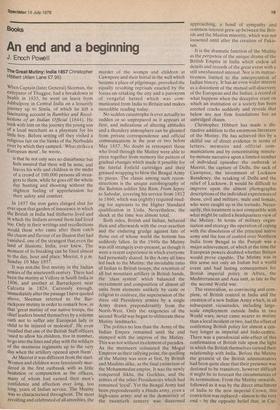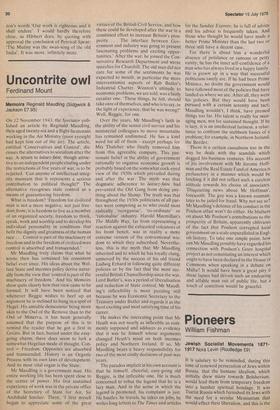Books
An end and a beginning
J Enoch Powell
The Great Mutiny: India 1857 Christopher Hibbert (Allen Lane £7.95) When Captain (later General) Sleeman, the extirpator of Thuggee, had a breakdown in health in 1835, he went on leave from Jubbulpore in Central India on a leisurely journey up to Simla, of which he left a fascinating account in Rambles and Recollections of an Indian Official (1844). He took with him on the journey the young son of a local merchant as a playmate for his little boy. Before setting off they visiled a religious fair on the banks of the Nerbudda river by which they camped. 'What strikes a European most', he wrote, is that he not only sees no disturbance but feels assured that there will be none, and leaves his wife and children in the midst of a crowd of 100,000 persons all strangers to them, while he goes off the whole day hunting and shooting without the slightest feeling of apprehension . for their safety and comfort.
In 1857 the iron gates clanged shut for ever upon that garden of innocence in which the British in India had thitherto lived and in which the Indians around them had lived too. Only in their writings and recollections would. those who came after them catch the charm and flavour of an illusion that had vanished, one of the strangest that even the land of illusions, India, ever knew. The moment of its breaking can be fixed almost to the day, hour and place: Meerut, 6 p.m. Sunday 10 May 1857.
It was not.the first mutiny in the Indian armies of the nineteenth century. There had been the mutiny at Vellore in South India in 1806, and another at Barrackpore near Calcutta in 1824. Curiously enough, immediately after the passage I have quoted above, Sleeman referred to the Barrackpore mutiny in order to remark how, in that 'great mutiny of our native troops, the Chief leaders bound themselves by a solemn oath not to suffer any European lady or Child to be injured or molested'. He even recalled that one of the British Staff officers 'used to allow his children, five in number, to go into the lines and play with the soldiers of the mutinous regiments up to the very day when the artillery opened upon them'.
At Meerut it was different from the start. Women and children were ferociously murdered in the first outbreak with as little hesitation or compunction as the officers, many of whom had earned their men's confidence and affection over long, too long, years of Indian service. The Mutiny was so characterised throughout. The most revolting and celebrated of all atrocities, the murder of the women and children at Cawnpore and their burial in the well which became a place of pilgrimage, provoked the equally revolting reprisals exacted by the forces on retaking the city and a paroxysm of vengeful hatred which was communicated from India to Britain and makes incredible reading today.
. No sudden catastrophe is ever actually so sudden or so unprepared as it appears at first; and indications of altering attitudes and a thundery atmosphere can be gleaned from private correspondence and official communications in the year or two before May 1857. No doubt in retrospect those who lived through the Mutiny were able to piece together from memory the pattern of gradual changes which made it possible for the fateful Enfield cartridges and their greased wrapping to blow the Bengal Army to pieces. The classic among such reconstructions is the unique autobiography of the Bahmin soldier Sita Ram, From Sepoy to Subedar, covering his service from 1812 to 1860, which was (rightly) required reading for aspirants to the Higher Standard qualification in Urdu. Nevertheless, the shock at the time was almost total.
Both sides, British and Indian, behaved then and afterwards with the over-reaction and the enduring grudge against fate of those out of whose world the bottom has suddenly fallen. In the 1940s the Mutiny was still strangely ever-present, as though it were a recent experience in which everyone had personally shared. In the Army all lines led back to the Mutiny: the inviolable ratio of Indian to British troops, the retention of all but mountain artillery in British hands, the 'class system' which balanced the recruitment and composition of almost all units from elements unlikely by caste or religion to coalesce, the supersession of the three old Presidency .armies by a single Army drawn preponderantly from the North-West. Only the exigencies of the second World war began to obliterate these Mutiny landmarks.
The politics no less than the Army of the Indian Empire remained until the end stamped with the impress of the Mutiny. This was not without its element of paradox. As the mutineers reinstated the Mogul Emperor as their rallying point, the quelling of the Mutiny was seen at first, by British and Muslims alike, as the final extinction of the Mohammedan empire. It was the newly conquered Sikhs, the Gurkhas, and the armies of the other Presidencies which had remained 'loyal'. Yet the Bengal Army had been preponderantly a Hindu army, even a high-caste army; and as the democracy of the twentieth century was discerned
approaching, a bond of sympathy and common interest grew up between the British and the Muslim minority, which was not loosened until after the creation of Pakistan.
It is the dramatic function of the Mutiny as the peripeteia of the unique drama of the British Empire in India which endow all details and records of the great event with a still unexhausted interest. Nor is its instructiveness limited to the interpretation of Indian history. It has an even wider interest as a document of the mutual self-discovery of the European and the Indian, a record of what happens when the deceptive crust on which an institution or a society has been erected cracks suddenly and reveals that below are not firm foundations but an unbridged chasm.
Christopher Hibbert has made a distinctive addition to the enormous literature of the Mutiny. He has achieved this by a skilful use of direct evidence in terms of letters, memoirs and official communications and by concentrating minuteby-minute narrative upon a limited number of individual episodes: the outbreak at Meerut, the capture of Delhi, the sack of Cawnpore, the investment of Lucknow Residency, the retaking of Delhi and the relief of Lucknow. It would be difficult to improve upon the almost photographic descriptions of the individual experiences of those, civil and military, male and female, who were caught up in the tornado. Necessarily, this treatment is not compatible with what might be called a headquarters view of the Mutiny. In terms of military organisation and strategy the operation of coping with the dissolution of the principal native army and the loss of control over Northern India from Bengal to the Punjab was a major achievement, of which at the time the European powers doubted whether Britain would prove capable. The Mutiny was in this sense not only an Indian but a world event and had lasting consequences for British imperial policy in Africa, the Mediterranean and Asia unit, as late as the the second World war.
The restoration, so convincing and complete, of British control in India and the creation of a new Indian Army which, in all subsequent vicissitudes, including largescale employment outside India in two World wars, never came nearer to mutiny than a local incident or two, had the effect of confirming British policy for almost a century longer as imperial and Indo-centric. There was a paradoxical side-effect of this confirmation of British rule upon the light in which the British themselves viewed their relationship with India. Before the Mutiny the greatest of the British administrators had been quite clear that their presence was destined to be transitory, however difficult it might be to forecast the circumstances of its termination. From the Mutiny onwards, followed as it was by the direct attachment of India to the now imperial Crown, this conviction was replaced — almost to the very end — by the opposite belief that, in Cur zon's words 'Our work is righteous and it shall endure'. I would hardly therefore close, as Hibbert does, by quoting with approval the conclusion of Percival Spear: 'The Mutiny was the swan-song of the old India'. It was more, infinitely more.



































 Previous page
Previous page